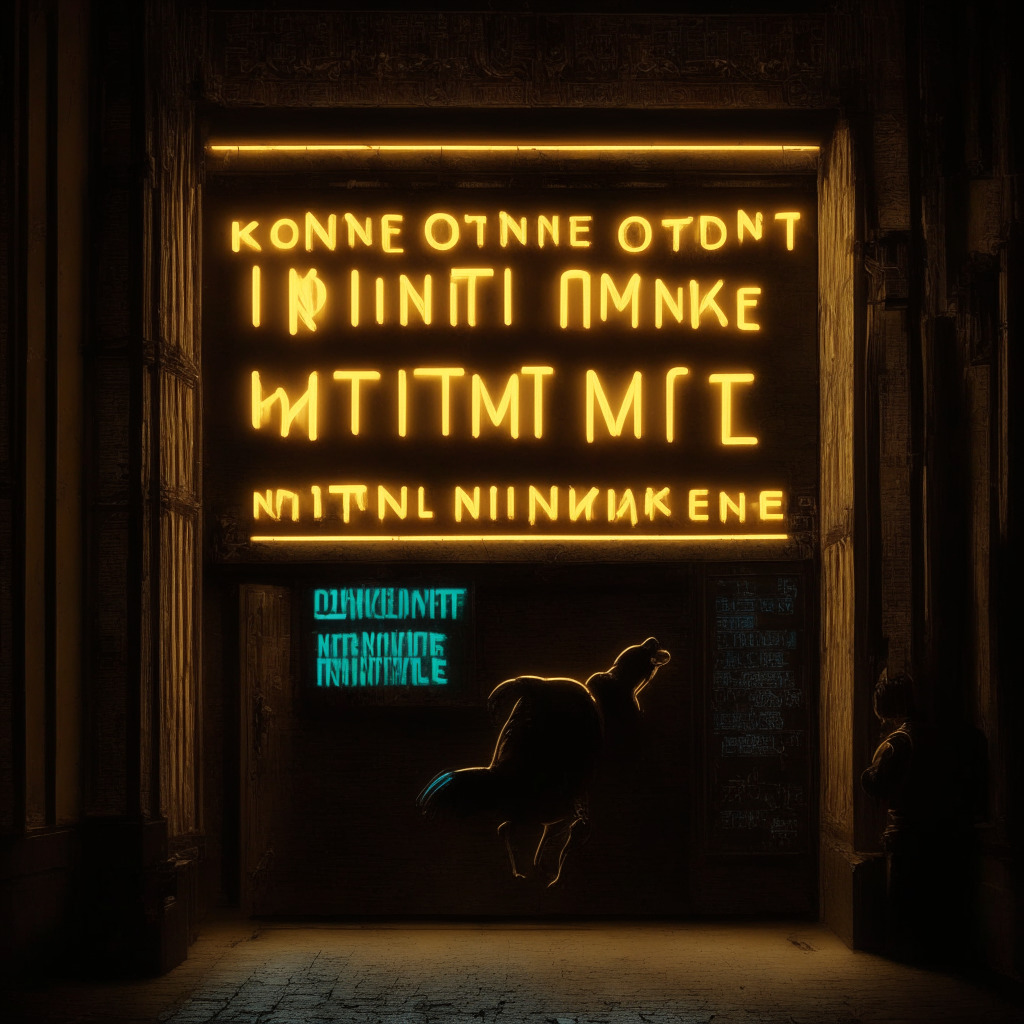“Choosing a consensus mechanism for a blockchain project is complex and multifaceted, involving the balancing of security, sustainability, scalability, regional preferences, and long-term project goals. The decision requires understanding and navigating through various project-specific details and an ever-evolving technology landscape.”
Search Results for: Consensus
Debate on Ripple CTO’s Call for Consensus Over Authority in XRP Ledger Upgrades
Ripple’s CTO, David Schwartz emphasized the need for community consensus before adopting the automated market maker (AMM) feature on the XRP Ledger. Schwartz clarified adoption could happen within two weeks if the majority supports it during governance voting. However, he cautioned against validators pushing for these modifications independently, highlighting the need for consensus.
The Double-edged Sword of ‘Consensus’: A Beneficial Forum or Spotlight on Division?
“Consensus” offers a platform for crypto-web and Web3 enthusiasts to discuss and address the pressing issues in the industry. The event’s discussions often reveal disagreements, highlighting inconsistencies in values and policies within the crypto community. Nevertheless, “Consensus” underscores the power of collaboration and discourse in shaping the future of decentralized systems.
Exploring Restaking: Boosting Innovation or Threatening Ethereum’s Security and Consensus?
‘Restaking’ is an emerging concept that is transforming the cryptographic landscape, paving the way for Etherum stakers to earn additional income. However, while it presents an opportunity to extend Ethereum’s decentralized trust to various systems, it also poses potential systemic risks to the ecosystem, highlighted by Ethereum co-founder, Vitalik Buterin.
Quantum Computing: Revolutionizing Blockchain Consensus and Reducing Environmental Impact
Researchers from universities in Australia and the US have proposed a novel proof-of-work (PoW) scheme for blockchain consensus using quantum computing. This PoW system has the potential to offer significant speedup and energy savings compared to classical hardware systems, enhancing blockchain applications’ efficiency and reducing environmental impacts.
Consensus 2023 Reflection: ICO Mania’s Mixed Legacy – Successful Projects and Scams Debated
At Consensus 2023, CoinDesk panelists reflected on the “ICO mania” period (2017-2018), highlighting both its opportunities and challenges. Initial Coin Offerings (ICOs) brought significant decentralized finance projects like Aave and 0x but also faced issues of investment fraud and securities violations, with 80% of ICOs found to be scams.
Balancing the Blockchain Trilemma: Core DAO’s Innovative Satoshi Plus Consensus Approach
Core DAO aims to address the blockchain trilemma – security, scalability, and decentralization trade-offs in layer-1 blockchain solutions. Utilizing Satoshi Plus Consensus, which bridges proof-of-work and delegated proof-of-stake, Core DAO’s approach potentially offers greater accessibility without compromising security or scalability. This strategy may reshape future blockchain network development and optimization.
Ethereum Consensus: Balancing Validator Roles and Security Risks Beyond the Merge
Ethereum co-founder Vitalik Buterin cautioned against extending Ethereum’s consensus beyond essential functions like validating blocks and securing the network. He highlighted that expanding consensus “duties” increases costs, complexities, and risks, potentially exposing the ecosystem to security vulnerabilities or 51% attacks. Buterin advocated for a minimalistic approach and assisting developers in finding alternative security methods.
G7 Consensus on Crypto Regulation: Balancing Innovation and Security in Blockchain Future
The G7 nation leaders have reached a consensus on blockchain and cryptocurrency regulations, fueling debates on potential benefits and drawbacks. Advocates believe regulations can provide structure, legitimacy, and credibility to the industry, while opponents argue it may stifle innovation and lead to excessive centralization of power.
Ethereum Beacon Chain Halt: A Test of Consensus Client Diversity and Network Resilience
Ethereum’s Beacon Chain faced a temporary halt in block finalization, but quickly resumed normal operations. The incident highlights the importance of consensus client diversity in maintaining stability and security in decentralized blockchain networks like Ethereum, while showcasing its inherent resiliency.
Crypto User’s Harsh Penalty in Morocco: A Call for Global Regulatory Consensus
In Morocco, a crypto user faced an 18-month prison sentence and a $3.7 million fine for purchasing a luxury car with Bitcoin – an illegal act in the country. This case highlights the complexities of cryptocurrency regulations and the legal grey area that poses challenges for crypto users worldwide, emphasizing the need for a unified regulatory framework.
Consensus 2023 Recap: Crypto Regulation, Election Impact, and Financial Milestones
The Consensus 2023 conference and Congressional hearings discussed critical cryptocurrency issues, including policy developments and the unclear delineation between securities and commodities. Upcoming legislation and the 2024 presidential election’s impact on crypto policies remain key subjects, as the industry navigates regulatory complexities and continues to grow.
Consensus 2023: Web3 Adoption, Corporate Interest, and the Need for Global Integration
Consensus 2023 showcased growing interest in Web3 technology adoption among large companies like Mastercard and Google Cloud. The event focused on essential Web3 strategies, innovations, and privacy, but could benefit from a stronger international presence to understand global opportunities.
Consensus 2023: TRON DAO’s Impact, Potential Challenges and the Future of Blockchain
The Consensus 2023 event showcased TRON DAO’s achievements and future plans, raising questions about interoperability, global regulatory frameworks, and practicality. Despite concerns, TRON DAO established valuable connections, indicating potential growth in the cryptocurrency and blockchain spheres.
Crypto Fiesta or Regulatory Siesta? Consensus 2023 Highlights the Battle for Blockchain’s Future
The Consensus 2023 festival wrapped up in Austin last week setting new attendance records and […]
Smart Contracts on Bitcoin: The Future of Blockchain or an Overreaching Gamble?
The recent “BitVM: Compute Anything on Bitcoin” white paper by ZeroSync’s project lead, Robin Linus, proposes a new way to implement complex off-chain smart contracts on Bitcoin. Based on a Turing Complete system, this method would broaden Bitcoin’s operations to include applications like tactical games verification, bridging BTC to foreign chains, and constructing prediction markets.
Crossroads of Innovation and Security: EU’s Proposed Regulations on Large-Scale AI Models
The European Union is reportedly discussing stricter regulations on large-scale language models (LLMs) like OpenAI’s GPT-4 and Meta’s Llama 2, aimed at controlling these models without overloading start-ups. These discussions touch on the implications of LLMs, user safety, and ethical AI deployment, mirroring the approach of the EU’s Digital Services Act.
Decoding The Future: Blockchain, Bitcoin, and the Fear of Centralized Digital Currencies
“Blockchain technology and cryptocurrencies are transforming financial infrastructures, providing a decentralised exchange method. Cryptocurrencies like Bitcoin could pave the way for a transparent, corruption-free global currency. However, concerns about government control, environmental impact, and the implications of Central Bank Digital Currencies (CBDCs) are also emerging.”
Achieving Finality in Blockchain: Irrevocable Transactions, Challenges and Future Prospects
“Finality in blockchain refers to the irrevocable confirmation of a transaction or block of transactions. Achieving finality has challenges like network latency and potential 51% attacks. However, improved security algorithms, consensus algorithms and advanced cryptographic techniques promise faster, more reliable confirmations, and permanence of transactions.”
Taiwan’s Upcoming Crypto Legislation: Progressive Regulation or Stifling Clampdown?
Taiwan plans to propose a special law to regulate emerging crypto businesses by November 2023, driven by concerns over offshore markets’ activities. There’s consensus on needing unique legislation for crypto, dissimilar to traditional financial instruments. Taiwan’s Financial Supervisory Commission is helping, releasing guidelines for investors’ protection, including complete segregation between exchange treasuries and customers’ assets. Critics argue that over-regulation might hinder organic growth and innovation.
EU’s New Crypto Regulatory Outlook: Balancing Sustainability, Transparency, and Market Growth
ESMA’s latest consultation paper on Markets in Crypto Asset regulation aims at integrating the crypto market by 2024, focusing on sustainability, consistency in crypto services, transparency in pre, and post-trade data, record-keeping by CASPs and accessible white papers. The initiative stresses environmental sustainability, encourages business continuity policies, and emphasizes real-time transparency in transactions.
Dogecoin Struggles Amid Market Stagnation: Is Meme Kombat the Next Rising Star?
“Dogecoin’s (DOGE) momentum is decreasing due to a 1% price drop and its value sinking under the 50-day moving average. Its Relative Strength Index (RSI) level indicates lack of interest from buyers. Although there are hopes for improvement via Twitter payment integration and potential endorsement by Elon Musk, these remain uncertain. A possible alternate investment could be Meme Kombat (MK), an emerging meme token with a promising gaming platform.”
Forecasting Bitcoin’s Future: Market Movements, ETF implications, and Cyber-security Enhancements
The Bitcoin community anticipates the outcome of the US job data with hopes of a surge in Bitcoin’s value. A potential gamechanger is the SEC’s expected approval of a Bitcoin Exchange-Traded Fund (ETF), which could attract significant investments and raise Bitcoin’s prices. However, maintaining vigilance is essential as Bitcoin’s value may fluctuate in the coming days.
Exploring Crypto Expansion in Latin America and the Caribbean: Boons and Challenges
The joint study by IDB and CCAF shows remarkable growth in cryptocurrency in Latin America and the Caribbean since 2016. The report highlights the need for understanding this emerging market and ensuring its secure and sustainable growth through collaborative efforts.
Cryptocurrency: The Dicey Dance between Global Regulation and Innovation Potential
Mário Centeno, head of Portugal Central Bank, calls for global cooperation in regulating cryptocurrencies due to the high-stake risks of digital assets and decentralized finance (DeFi). He believes uncoordinated international laws could be exploited by companies and that regulating global players at the national level may be ineffective.
Navigating the Regulatory Maze: Driving Stablecoin Legislation Under Biden’s Administration
Chair Patrick McHenry of the US House of Representatives’ Financial Services Committee affirms his commitment to regulate stablecoins. He steers two digital asset bills targeted at stablecoin regulation, and bringing clarity to the role between the CFTC and SEC. McHenry highlights potential bipartisan support and the global influence of dollar-denominated stablecoins, emphasizing complex power dynamics beyond the digital asset scope.
Leased Proof-of-Stake: Game-Changer or Just Another Player in Blockchain Technology?
“Blockchain technology introduces Leased Proof-of-Stake (LPoS), an innovative mechanism aimed at overcoming crypto mining complications. LPoS allows tokenholders to lease their tokens to validator nodes, improving their chance at generating new blocks and sharing transaction fees. While offering benefits such as decentralization and fixed tokens, LPoS also maintains control by restricting trade or transfer of leased tokens.”
Watching Ethereum’s Unfold: ETF Applications, Market Manipulation, and the Shift to Proof-of-Stake
“Investment giants, Invesco and Galaxy Digital, are reportedly seeking regulatory approval for their spot Ethereum ETF. This follows prior similar requests like ARK 21Shares and VanEck. The introduction of Ether futures offers traditional investors access to crypto-assets and risk diversification, despite potential market manipulations and challenges in the regulatory approval process.”
A Fresh Hope: The Resurgence of Holesky Test Network and Ethereum’s Future Prospects
The resounding success of Ethereum’s second attempt to establish the Holesky test network addresses scalability concerns. Holesky accommodates 1.4 million validators, twice as many as Ethereum. It is predicted to contribute significantly in introducing the Dencun hardfork and further outpace Ethereum’s competitors.
European Commission’s Effort to Mitigate Cryptocurrency’s Environmental Impact: A Balanced Digital Future?
The European Commission has secured an 800,000 euro contract to develop methodology and sustainability standards that alleviate environmental hazards associated with cryptos. This move stems from concerns over how crypto transactions and mining may negatively affect the environment, economy, and society.
Kraken’s Leap into Stock Trading: A Bold Move or a Risky Venture?
“Kraken, a crypto exchange, is reportedly considering a venture into US stock trading, planning to launch its stock trading services in the US and UK in 2024, despite legal and regulatory challenges. The move indicates a potential significant diversification for platforms typically exclusively focused on digital assets.”
Emergence of Taiwan’s Crypto Association: A New Era for Global Currency Adoption
Taiwan’s crypto community is set to establish an operational group this October, designed to facilitate digital currency adoption and self-compliance. Spearheaded by nine local cryptocurrency exchanges, this initiative aims to foster a healthy industrial environment and ensure the industry’s robust wellbeing, ultimately propelling Taiwan onto the global cryptocurrency stage.






























